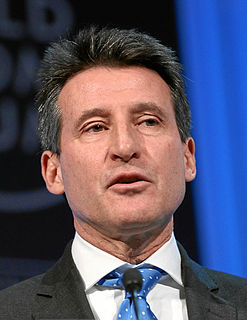A Quote by Sebastian Coe
When the subsidies are going out there to fund arts, I'd like to see jazz given a better shake of the dice. It attracts as many people as opera does, but not the subsidies.
Related Quotes
I think when ordinary working people come home, turn on the TV and see a gala of a bunch of people at, you know, a rich gala all subsidized by taxpayers claiming their subsidies aren't high enough, when they know those subsidies have actually gone up - I'm not sure that's something that resonates with ordinary people.
There's a long history in the Middle East of "bread intifadas," starting with 1977 in Egypt, when Anwar Sadat tried to lift bread subsidies. People rebelled and poured into Tahrir Square, shouting slogans against the government just like they did earlier this year. Sadat learned his lesson and kept bread subsidies in place, and so did a host of other Middle Eastern dictators - many of whom were propped up for years by the West, partly through subsidized American wheat.
We want a comprehensive package that covers export subsidies, tariffs and overall levels of support. British Prime Minister Tony Blair is making central to his summit speech that he wants to abolish all export subsidies. It is up to him to push the European Union in that direction, and the U.S. needs to reciprocate.
Subsidies for the oil, gas and coal industries are projected to cost taxpayers more than $135 billion in the coming decade. At a time when scientists tell us we need to reduce carbon pollution to prevent catastrophic climate change, it is absurd to provide massive subsidies that pad fossil-fuel companies' already enormous profits.
Subsidies and grants throw off the natural market signals that are supposed to allow students to make informed decisions on the true value of a college degree. Increasing aid, and expanding subsidies only intensifies the problem which will lead us down a path of more college dropouts and a continuation of skyrocketing tuition.
Corn is already the most subsidized crop in America, raking in a total of $51 billion in federal handouts between 1995 and 2005 - twice as much as wheat subsidies and four times as much as soybeans. Ethanol itself is propped up by hefty subsidies, including a fifty-one-cent-per-gallon tax allowance for refiners.
A democratically governed national fracking fund should be set up, perhaps similar to what Norway and Alaska have. Areas of drilling should be rented to companies through public tender, with or without subsidies, and a rising share of profits beyond a negotiated upper limit should be deposited in the national capital fund.
































